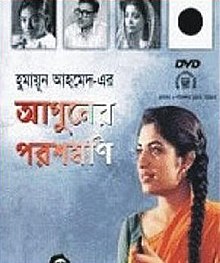 |
| Source: Wikipedia |
Bangladesh (Bengali), 1995
123 min, war
Director: Humayun Ahmed

The first film directed by the late Humayun Ahmed, a famous Bangladeshi novelist and director.
Caught in the middle of a genocide, one family struggles to survive
In the midst of this terrible situation, one family in Dhaka is trying to live life as normally as possible. But then the father brings home a man, a stranger that the family has never met before. They soon discover that he's a member of the Mukti Bahini. They must decide whether to help him and endanger themselves, or to make him leave and probably be killed.
The full film (without English subtitles, unfortunately) on Youtube:
I don't usually like films about war, but this one is an exception. It beautifully captures the struggles of a family caught in a terrible situation - in the midst of war and genocide, how can you keep going? Do you choose to do the safe thing and keep a low profile, or do you try to fight against the terrors around you in whatever way you can? The film demonstrates a range of responses, from the man who has locked himself in his house for months to the freedom fighter who plots to attack the Pakistani forces directly. It's a delicate balance, and each person and each family must make their own decision on how to respond to the circumstances.
Depicting the atrocities
Love in the midst of violence
My favorite part of this movie is the love story between the freedom fighter and the family's daughter. She truly believes in the cause that he's fighting for, and she idolizes him because of that. But she also falls in love with him. The struggle that she faces between encouraging him to put himself in danger for the cause and wanting to protect him is raw and emotional. It comes to the fore at the end, when she begs him to open his eyes to see the light of morning. "One day we'll gain independence! And on that day I will play the harmonica and dance. Won't you be there with me? Won't you?"
A question for you, my dear reader: what did you think of the ending?
"Aguner Poroshmoni" song is very heart touching specially for Rabindranath Tagore, cause he is one the most greatest writter of the world. I could self realize again when I listen the song and feel the lyrics.
ReplyDeleteIts amazing that the song was written by Tagore as a dedication to Jesus !
Delete